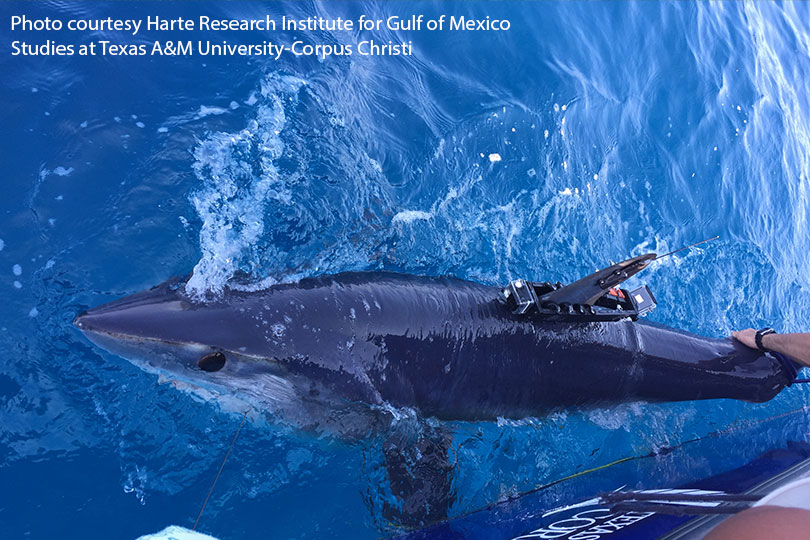By Jessica Domel
Multimedia Reporter
Families across the nation will soon have the opportunity to learn more about fascinating shark research taking place right now in Texas.
Researchers from the Harte Research Institute for Gulf of Mexico Studies (HRI) at Texas A&M University-Corpus Christi appeared on National Geographic’s Sharkfest July 18 and will appear on Discovery’s Shark Week Thursday, July 28.
“With both programs, we’re looking at short-fin makos. In Sharkfest, we looked at an interaction between an angler and a short-fin mako that came up on him a couple of years ago off the coast of Alabama,” Dr. Kesley Banks, HRI assistant research scientist, said. “We were able to dissect the behavior of the mako and see what was going on there.”
That episode, “Stealth Hunters,” was part of the eight-episode series, “Shark Attack Files” on National Geographic.
“That’s part of a larger episode looking at stealth techniques that sharks use when interacting with potential prey,” Banks told the Texas Farm Bureau Radio Network. “It was a peaceful interaction. The angler was not attacked in any way.”
Banks and Dr. Greg Stunz, director for the Center for Sportfish Science and Conservation, will appear on Shark Week’s “Monster Mako Under the Rig” at 9 p.m. Thursday, July 28 on the Discovery Channel and Discovery Plus.
“For Shark Week, we are looking at how short-fin makos use artificial reefs during their migrations to and from the Gulf of Mexico,” Banks said.
The episode features a team of Texas researchers who have discovered a mysterious group of mako sharks in the Gulf of Mexico in the waters off Port Aransas.
Scientists at HRI are studying the makos, trying to discover what sets them apart from other makos.
Stunz, who is a professor of marine biology at Texas A&M University-Corpus Christi, will also appear on “Sharks! With Tracy Morgan” at 7 p.m. July 28.
That episode will include scientists from across the country with comedian Tracy Morgan. They’ll identify the most awe-inspiring and ferocious sharks in the ocean.
Banks and Stunz aren’t appearing on the programs to instill a fear of sharks in audiences. Instead, they’re working to engage the public and share research underway in Texas.
“Sharks are such great ambassadors for the ocean,” Stunz said. “They are a key that opens the door for scientific curiosity and learning. Most people are fascinated with sharks, and with the help of these charismatic animals, we have a great opportunity to teach children and adults about why healthy oceans are essential to the well-being of people and the planet.”
Banks and Stunz have been featured on television multiple times, highlighting their work tagging and tracking sharks off the beaches and on artificial reefs in the Gulf of Mexico.
Banks said while there is still much work to be done, attitudes about sharks have drastically shifted toward conserving sharks rather than harvesting them.
While some may be worried hearing about sharks off the coast of Port Aransas, Banks said there’s no reason to fear.
“Honestly, you’re closer to a shark every time you’re in the ocean than you think you are. As long as you’re not provoking an interaction, you’re not likely to have a negative interaction with a shark,” Banks said. “If you’re fishing or you’re chasing after one, those are called provoked interactions. Even Shark Week has videos where a drone is flying over a surfer, and you see a shark coming close and then leave. Sharks aren’t interested by us, but they do have to come in close enough to use their senses to determine what we are.”
If people would like to reduce the likelihood of an interaction with a shark, they can avoid swimming at dawn or dusk and avoiding dark-colored clothing in the water.
“Don’t wear jewelry in the water, which tends to flash like a fish,” Banks said. “There are things you can do to minimize your interactions, but for the most part, you’re closer than you think you are. They don’t care about us. We’re not on the menu.”

